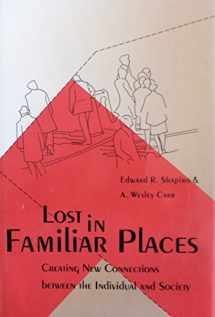
Lost in Familiar Places: Creating New Connections Between the Individual and Society
Book details
Summary
Description
In this world of change, individuals feel increasingly lost - within families and in workplaces - and unsure of the roles required of them. In this book a psychoanalyst and an Anglican priest, using a combination of psychoanalysis and social systems theory, offer suggestions to help people regain their bearings. The authors begin by discussing how life prepares the individual to participate in groups through the family before turning their attention to the larger organizations in which we work and participate. All the people within a group have their own subjectively felt perceptions of the environment. According to Shapiro and Carr, when individuals can negotiate a shared interpretation of the experience and of the purposes for which the group exists, they can further their development and that of the organizations. The authors suggest how this can be accomplished and conclude with some broad speculations about the continuing importance of institutions for connecting the individual and society.


We would LOVE it if you could help us and other readers by reviewing the book
Book review



